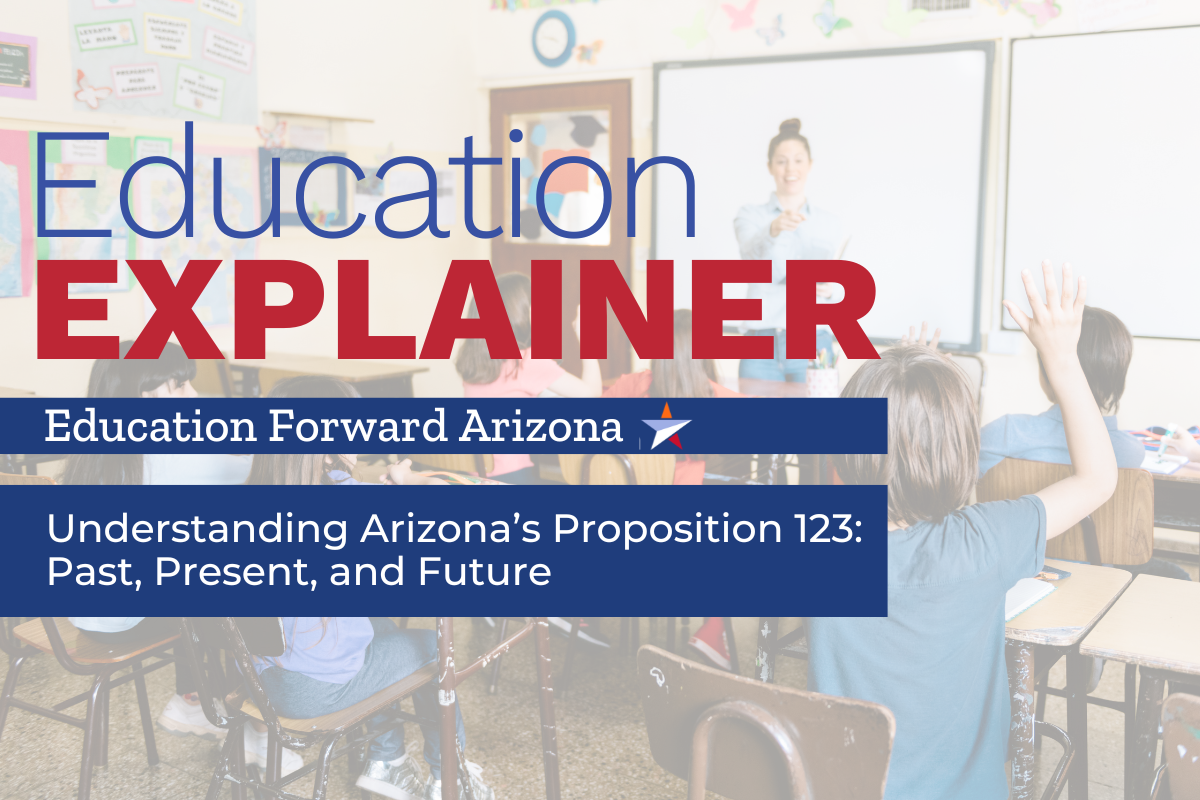
Understanding Arizona’s Proposition 123: Past, Present, and Future
Understanding Arizona’s Proposition 123: Past, Present, and Future
Arizona’s Proposition 123 has played a substantial role in funding K-12 education since its passage in 2016. As the measure nears its expiration in June 2025, discussions about its renewal and potential reforms are at the forefront of state politics. To better understand the implications of the current legislative negotiations that will determine what the legislature ultimately sends to the voters for their approval, it’s important to understand the history of Prop 123, its current status, and the proposed changes from the bipartisan compromise that voters passed in 2016 including the role of Empowerment Scholarship Accounts and the percentage distribution of funds from the State Land Trust.
What is Prop 123?
In 2016, Arizona voters approved Proposition 123, a constitutional amendment that increased the annual distribution from the State Land Trust Permanent Fund to public K-12 education from 2.5% to 6.9%, providing schools approximately $300 million per year. This was part of the settlement of a longstanding lawsuit that the state lost. The judge ruled that the lawsuit correctly alleged that the state had underfunded education between 2010 and 2013, by not accounting for inflation in the distribution formula authorized by Arizona voters in Prop 301 in 2000.
When the voters approved Prop 123 in May of 2016, they authorized the state to draw an additional $3.5 billion over ten years from the trust, with the funds earmarked for public K-12 education. The State Land Trust Permanent Fund is a constitutionally established fund that supports public education in Arizona. The fund is primarily financed through revenue generated from the sale or lease of state trust land.
Why are we talking about Prop 123 right now?
The increased distribution has helped fund Arizona’s public K-12 education system without raising taxes. However, this arrangement expires at the end of June this year, prompting lawmakers and stakeholders to consider its renewal.
Proposition 123 is scheduled to expire on June 30, 2025. Without renewal, the distribution from the State Land Trust Permanent Fund will revert to 2.5%, significantly reducing the annual funding available for K-12 education by about $300 million per year. Since Prop 123 will not be renewed by the June 30 deadline, the state remains obligated to meet its education funding commitment—requiring those dollars to be drawn from the General Fund.
The current funds generated through Proposition 123 benefit various stakeholders within the education system, including:
- K-12 Public Schools receive the majority of the funding, which supports operational costs, educational programs, and infrastructure.
- Educators benefit from salary increases and professional development opportunities funded by the measure.
- Support Staff including custodians, bus drivers, and administrative personnel, who play a crucial role in the daily functioning of schools.
- Students experience improved educational outcomes due to enhanced resources, better-equipped facilities, and a more stable learning environment.
What’s the Debate Over this Version of Prop 123?
Several proposals have been introduced to renew and modify Proposition 123.
Governor Hobbs’ plan seeks to maintain the distribution rate at 6.9%, with the funds allocated to flexible school funding and teacher pay. These allocations aim to address the teacher shortage through increased pay and provide districts additional money to use for issues that enhance overall educational quality without raising taxes.
Republican lawmakers, who hold the majority in the legislature and therefore can ultimately place something on the ballot without the Governor’s approval, have proposed maintaining the distribution rate at 6.9%, with the funds exclusively dedicated to teacher pay raises. This approach focuses almost exclusively on increasing teacher salaries to attract and retain educators but does not address other aspects of school funding. It has been reported that Republicans are also seeking to include Arizona Constitutional protections of Empowerment Scholarship Accounts (ESAs or vouchers) as part of the ballot measure that would renew Prop 123. Arizona’s Empowerment Scholarship Account program allows parents to use public funds to pay for private school tuition, homeschooling, tutoring, online curriculum, and other education-related expenses outside the traditional public school system.
Arizona was the first state to create an ESA program in 2011. It was originally designed for a limited group of students: those with disabilities, in failing schools, in foster care, or from military families. Over the next decade, eligibility expanded modestly. In 2017, state lawmakers attempted to make ESA access universal, but voters rejected that expansion by a wide margin—about 65% opposed—in 2018. In 2022, Republican lawmakers passed House Bill 2853, which made all Arizona students eligible for ESAs, regardless of income, school district, or academic needs – effectively creating the first universal school voucher program in the nation. The expansion has subsequently cost taxpayers over $1 billion.
What’s next for Prop 123?
Proposition 123 has been instrumental in providing additional funding for Arizona’s K-12 public schools, without raising taxes, contributing to improvements in education quality and teacher compensation.
Without its renewal, the responsibility of funding approximately $300 million in education investments would shift from the State Land Trust to the state’s General Fund, potentially impacting other critical areas of education investment such as: early childhood learning and childcare programs, postsecondary access initiatives like Dual Enrollment and Career and Technical Education Districts (CTEDs/JTEDs), and financial aid programs such as Arizona College Promise scholarships that support students from low-income backgrounds.
Reminder: Prop 123 was originally a voter-approved measure, so any proposal the legislature passes will go back to Arizona voters in 2026
